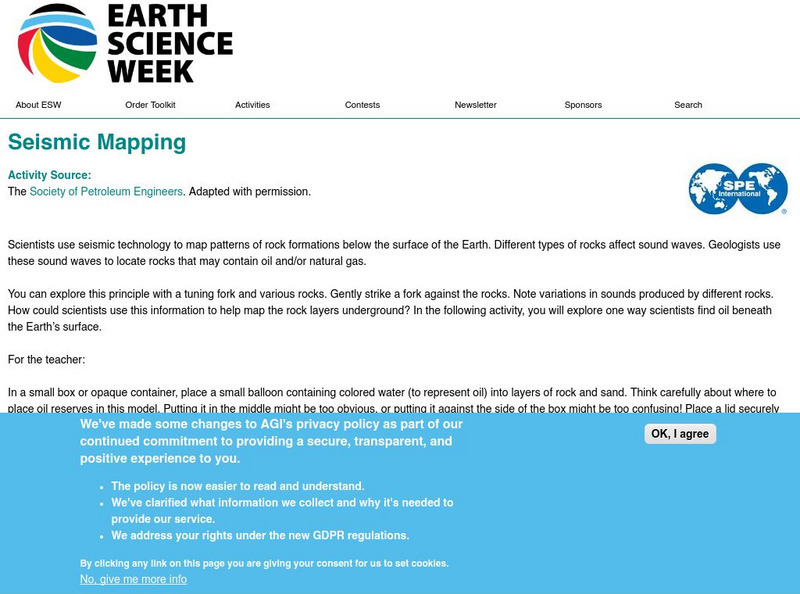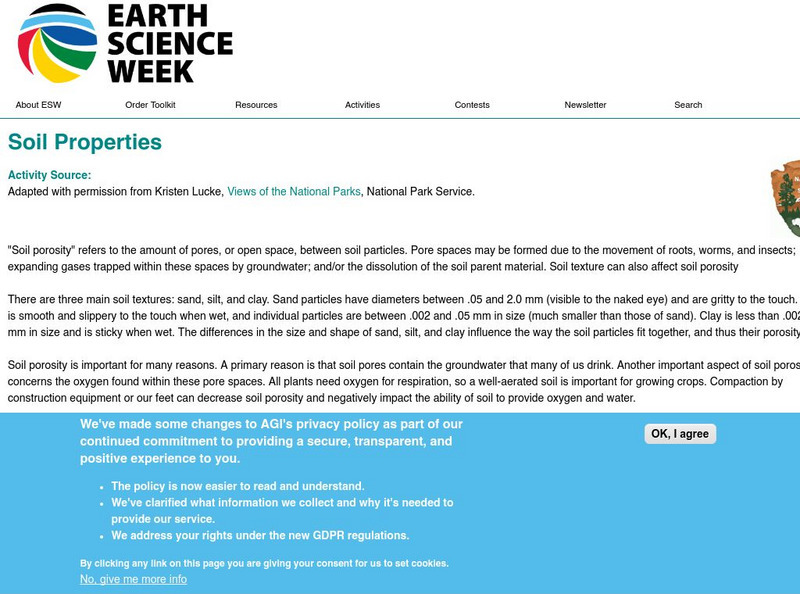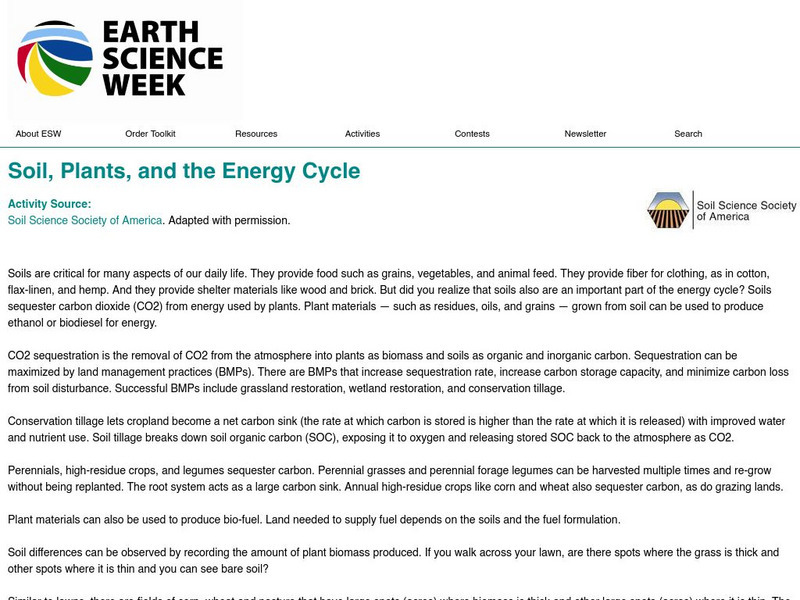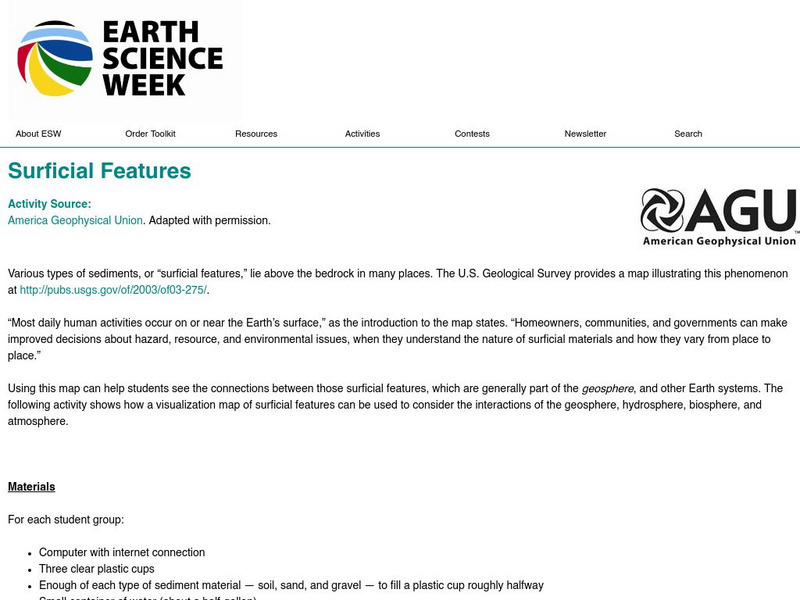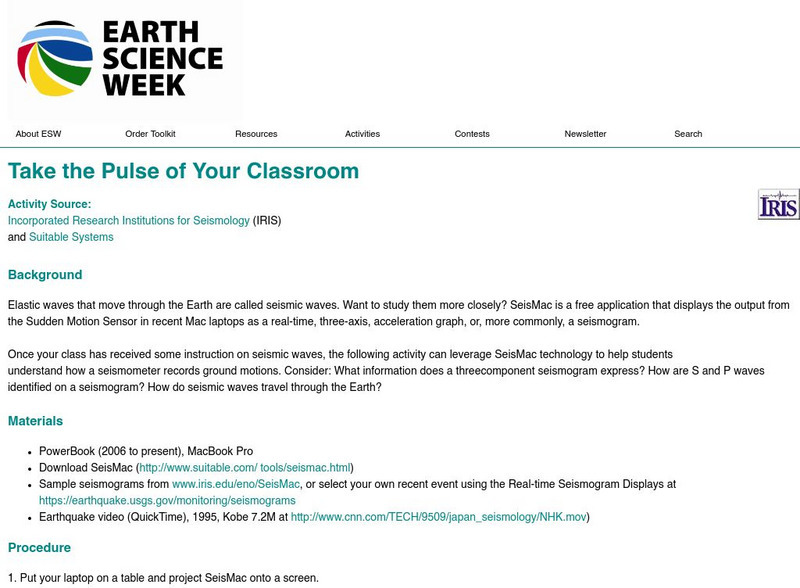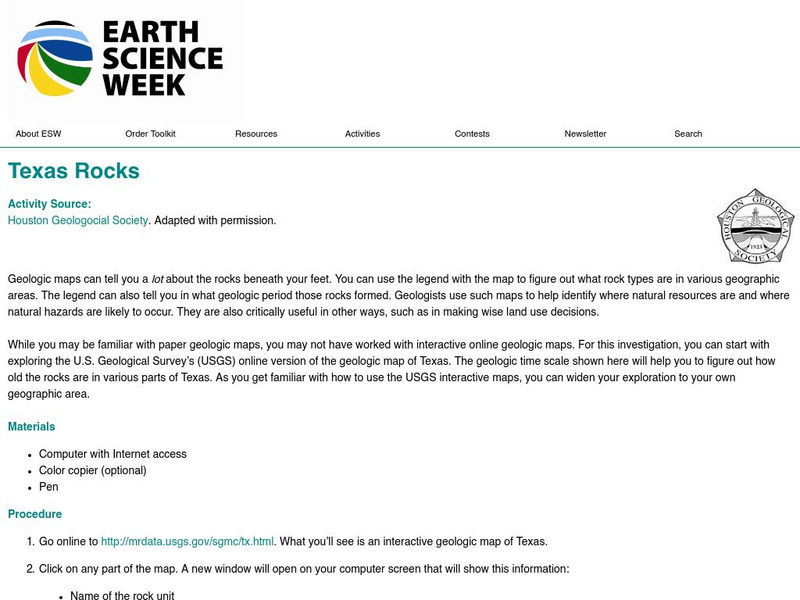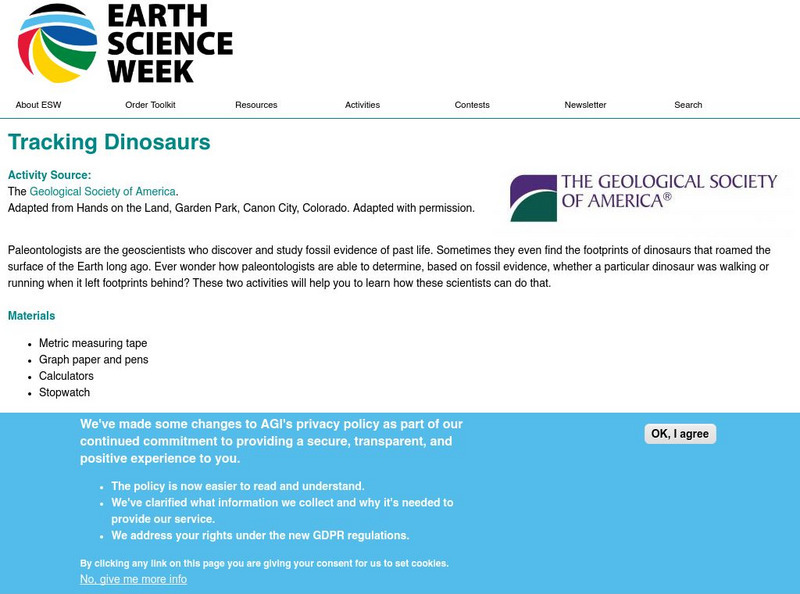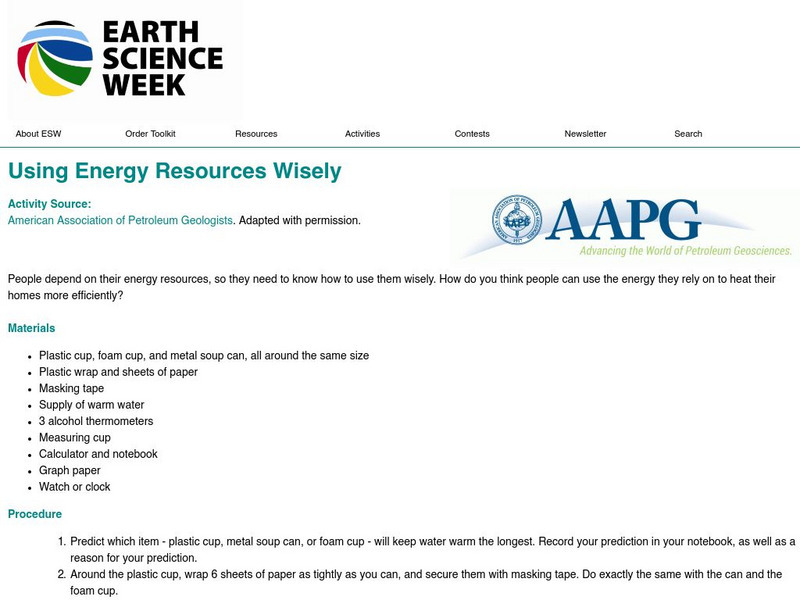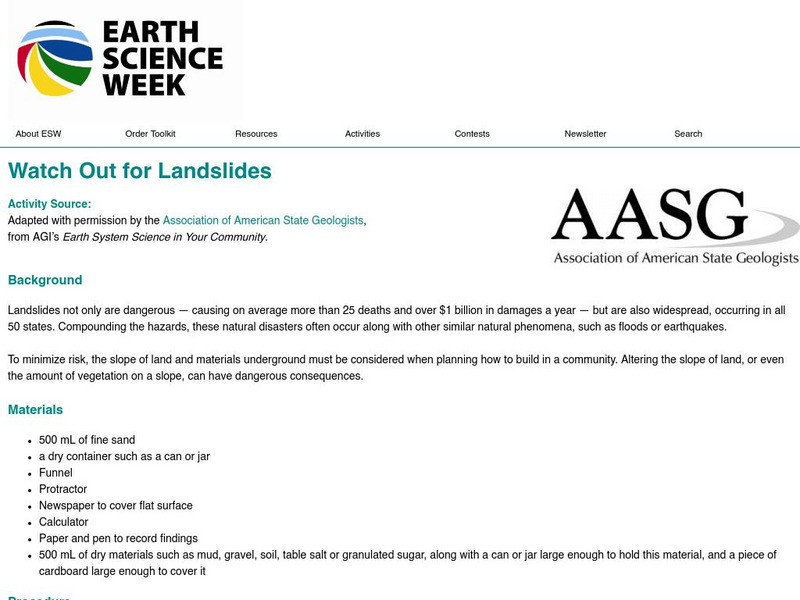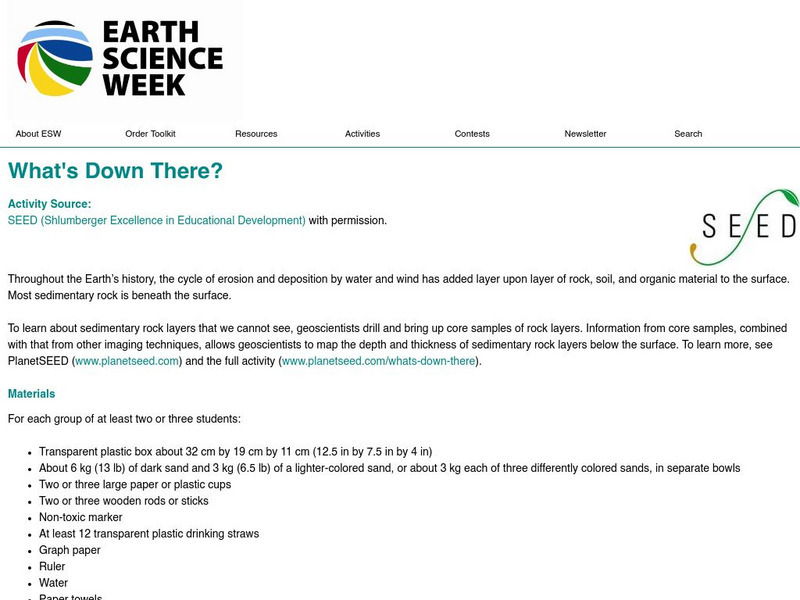American Geosciences Institute
American Geosciences Institute: Earth Science Week: Seismic Mapping
Young scholars become scientists, and learn about the usef of seismic technology to map patterns of rock formations below the surface of the Earth.
American Geosciences Institute
American Geosciences Institute: Earth Science Week: Sinkholes in a Cup
Students simulate a sinkhole, and discover the geological catalysts that happen beofore sinkholes occur.
American Geosciences Institute
American Geosciences Institute: Earth Science Week: Sky and Cloud Windows
In this activity, students will conduct experiments or participate in demonstrations to answer questions about sky and weather phenomena.
American Geosciences Institute
American Geosciences Institute: Earth Science Week: Soil Color and Redox Chemistry
Students use chocolate candies to simulate the process that occurs in saturated soil when Fe3+ is reduced to Fe2+ due to a microbial mediated redox reaction.
American Geosciences Institute
American Geosciences Institute: Earth Science Week: Soil Moisture
This set of activities introduces students to the basic properties and measurements of soil water, and how the global distribution of soil moisture is monitored.
American Geosciences Institute
American Geosciences Institute: Earth Science Week: Soil Properties
Students investigate soil porosity by building a model using the three main soil textures: sand, silt, and clay.
American Geosciences Institute
American Geosciences Institute: Earth Science Week: Soil, Plants, and the Energy Cycle
Students explore what kind and how much bio-mass can be produced in an area around your city or town. They figure how many gallons of fuel can be expected from one acre of crop land, and how much carbon can be sequestered in the local area.
American Geosciences Institute
American Geosciences Institute: Earth Science Week: Soil, the Forgotten Resource
Here is a simple exercise that will allow you to compare the rates and amounts of erosion that result from various land uses.
American Geosciences Institute
American Geosciences Institute: Earth Science Week: Space Archaeology
Want to be an archaeologist without leaving school? Use a computer to become a space archaeologist and identify burial sites on Earth.
American Geosciences Institute
American Geosciences Institute: Earth Science Week: Surficial Features
Using a surficial features map, students see the connections between those features and other Earth systems. They will consider the interactions of the geosphere, hydrosphere, biosphere, and atmosphere.
American Geosciences Institute
American Geosciences Institute: Earth Science Week: Survey Mark Hunting
In this activity, students find data on a location and description of survey marks in the area, and then they search for them through a variation of geocaching.
American Geosciences Institute
American Geosciences Institute: Earth Science Week: Take the Pulse of Your Classroom
In this activity, students leverage SeisMac technology to understand how a seismometer records ground motions.
American Geosciences Institute
American Geosciences Institute: Earth Science Week: Texas Rocks
For this investigation, students start exploring the U.S. Geological Survey's (USGS) online version of the geologic map of Texas. The geologic time scale shown will help them figure out how old the rocks are in various parts of Texas.
American Geosciences Institute
American Geosciences Institute: Earth Science Week: The Earth Trek Gravestone Project
The Gravestone Project, part of the global citizen science program called EarthTrek, seeks volunteers to visit cemeteries around the world and collect scientific data on how marble gravestones are weathering.
American Geosciences Institute
American Geosciences Institute: Earth Science Week: The Mountain Blows Its Top
Students will observe fault movements on a model of the earth's surface.
American Geosciences Institute
American Geosciences Institute: Earth Science Week: The Slope of Land in Your Community
Students investigate how particle size and shape relate to the maximum slope angle the particles will maintain during a landslide.
American Geosciences Institute
American Geosciences Institute: Earth Science Week: Third From the Sun
Students learn about the history of Earth imaging, the Landsat satellite program. They develop interpretation skills as they play a game that involves inferring the subjects of various Landsat images.
American Geosciences Institute
American Geosciences Institute: Earth Science Week: Tracking Dinosaurs
Two activities that will help students learn how paleontologists are able to determine, based on fossil evidence, whether a particular dinosaur was walking or running when it left footprints behind.
American Geosciences Institute
American Geosciences Institute: Earth Science Week: Using Energy Resources Wisely
Students test which type of material retains heat the longest.
American Geosciences Institute
American Geosciences Institute: Earth Science Week: Wash This Way!
Students use glitter to test the effectiveness of hand washing.
American Geosciences Institute
American Geosciences Institute: Earth Science Week: Watch Out for Landslides
Students investigate how particle size and shape relate to the maximum slope angle the particles will maintain during a landslide.
American Geosciences Institute
American Geosciences Institute: Earth Science Week: What's Down There?
Students build a model to learn about the cycle of erosion and deposition by water and wind which deposits layer upon layer of rock, soil, and organic material to the surface.
American Geosciences Institute
American Geosciences Institute: Earth Science Week: What's Under My Feet? Learning to Use a Geologic Map
Students use geologic maps to learn about rocks and minerals.
American Geosciences Institute
American Geosciences Institute: Earth Science Week: Where Growth Meets Growth
Students identify fire risk factors for a property located near a wildland area.


